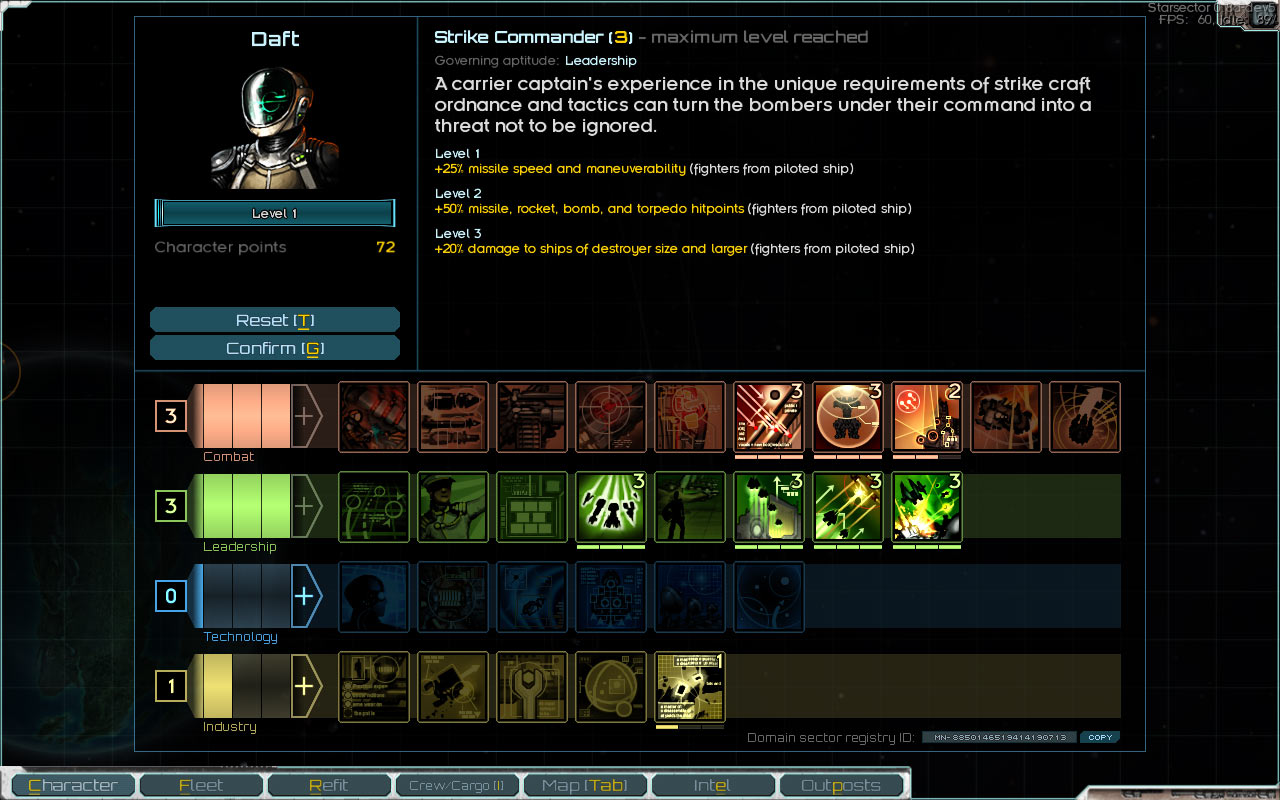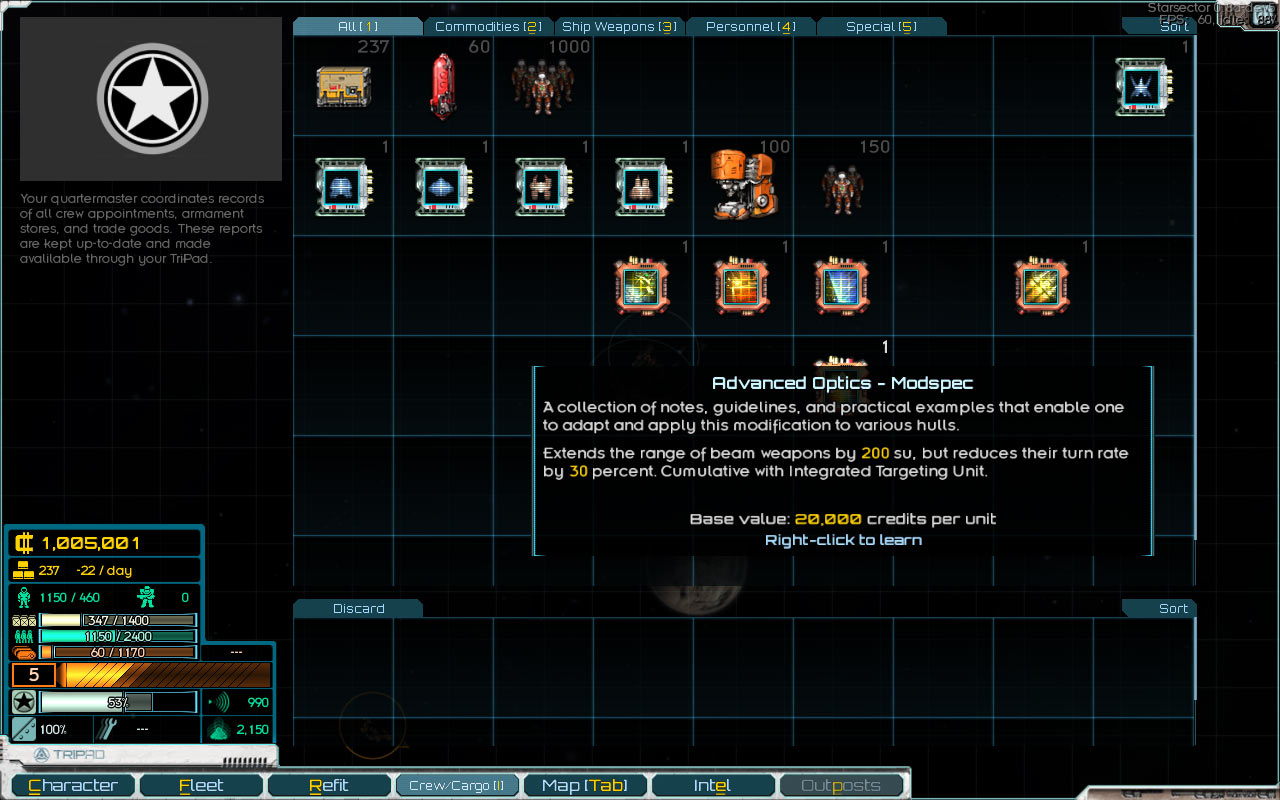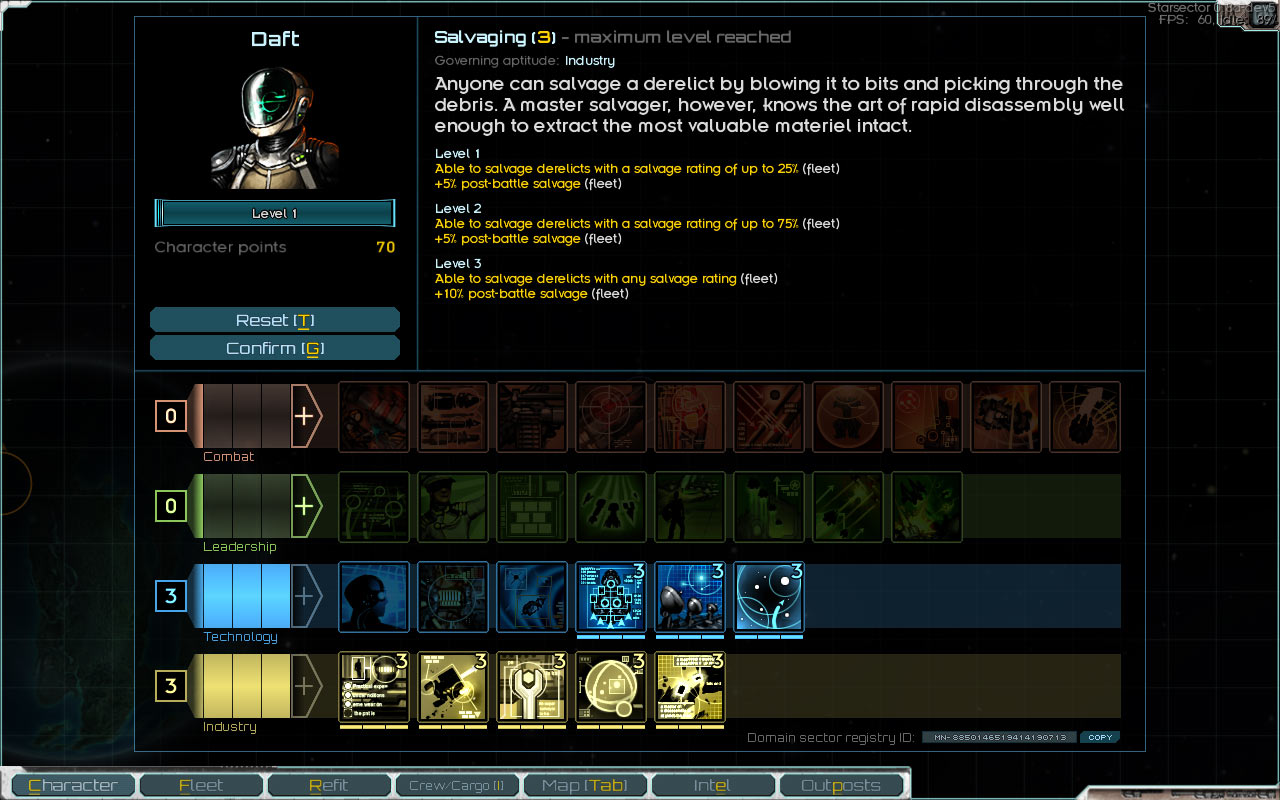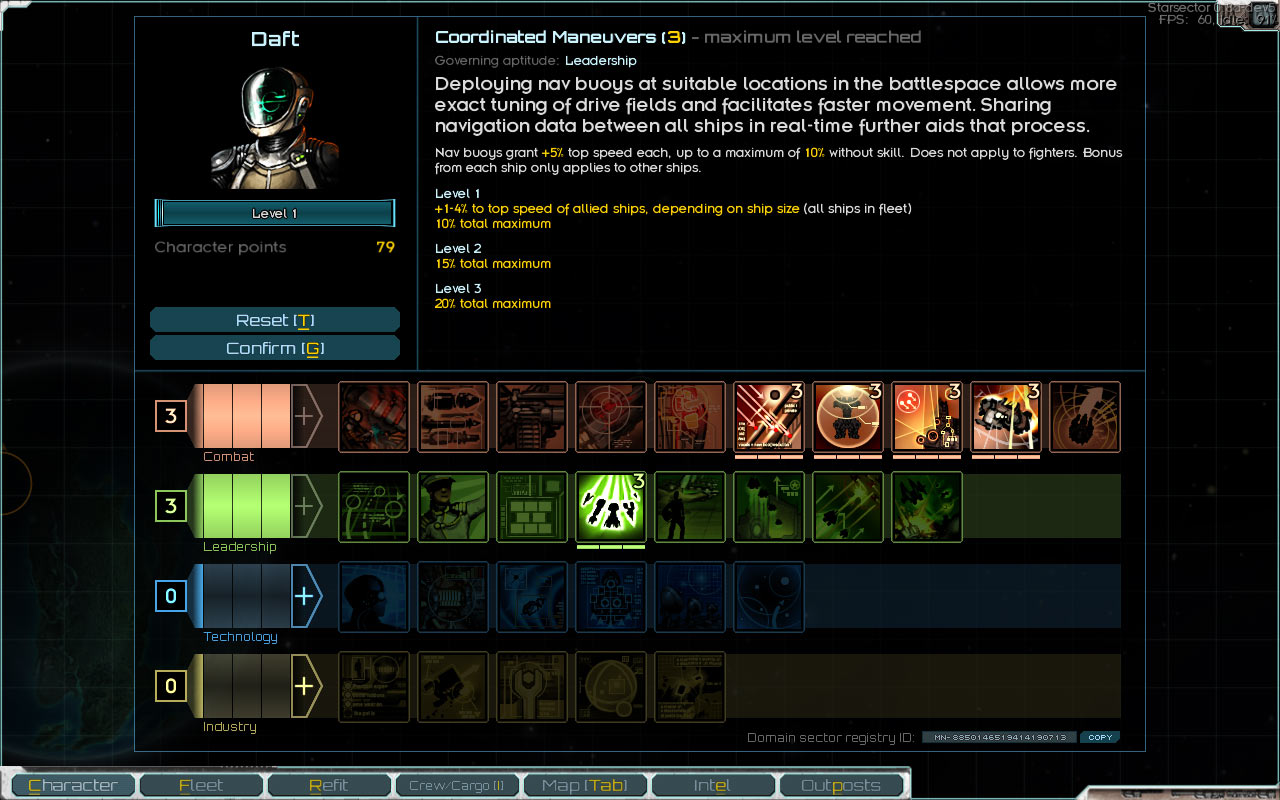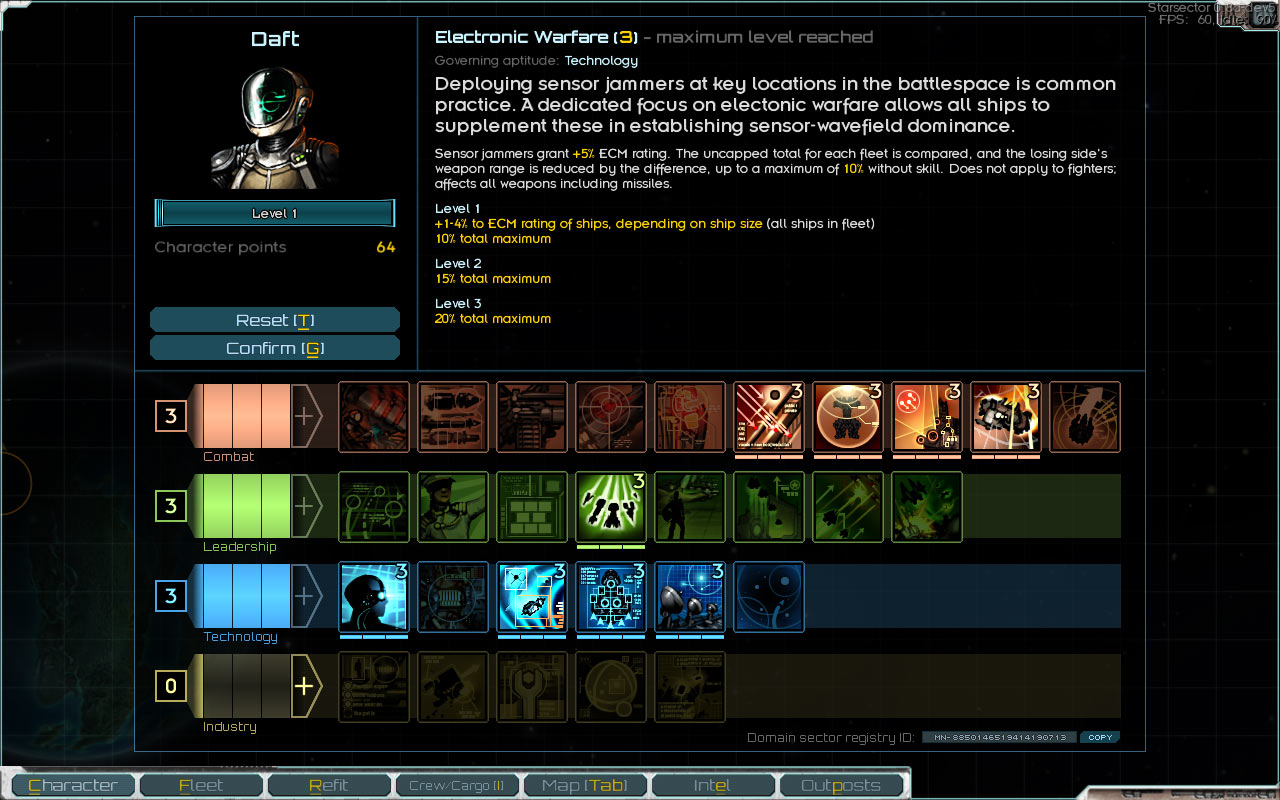Skill Overhaul
The current skill system in Starsector was added quite a while ago. That in itself isn’t a reason to redo it, but as with all first-pass systems, some downsides of the implementation became apparent along the way.
But why update it now, rather than sometime down the line? New features in this release need skills to complement them, and adding more skills to the old system would just be adding more stuff to redo later – it’s more efficient to overhaul the system now, and add the new skills in a hopefully-final form. In addition, it’ll be nice to address some long-standing balance issues, but more on that later.
First, let’s take a quick look at the old system. There are 4 aptitudes – Combat, Leadership, Technology, and Industry – and each aptitude has skills under it. The maximum level of a skill is determined by the level of the aptitude it’s under, and the player gets 2 skill points per level and 1 aptitude point every other level.
Skills have 10 levels, a base effect that increases with skill level (e.g. 2% more damage per level), and two perks – each providing significant and sometimes game-changing bonuses – at level 5 and 10 in the skill.
Now, instead of talking about the issues with this system, what I’d like to do is talk about the new system, and mention the issues in the context of how they’re being addressed.
New System
The basic shape is the same – aptitudes and skills, with aptitude level limiting skill level. However, skill and aptitude level is now capped at 3, and there’s only one type of points – “character points” – instead of separate points for skills and aptitudes. The player gets one point per level.
In addition to simplicity, the benefit of only having one kind of points is being able to max out a skill at a much lower level. This is good because if a skill has bonuses that are required for a playstyle, the player can pick those up quickly instead of having to wait until their aptitude points build up, as they would with the old system.
Unlike with the old system, aptitudes don’t have any beneficial effect aside from opening up higher skill levels. At first glance, that doesn’t feel great – spending points to get nothing tangible right away. So, why?
It’s impossible to balance everything perfectly. What aptitudes do is add an error margin for balance.
Say there’s a great skill in Technology, that you would absolutely pick up for 3 points, every game. But if this game, you’re not investing any points in Technology, the actual cost of the skill is 6 points – 3 to max the aptitude, 3 for the skill. A skill can be almost twice as good as anything else point for point and still not be a must-get, which is a much more realistic balance goal than “everything is perfectly equal”. The same could also be achieved with separate aptitude points, but that has other downsides, as mentioned earlier.
We still want to balance skills as well as possible to minimize must-get skills within a given aptitude and enable more build variety, but if that fails, “must get within an aptitude” is a smaller problem than “must get every game”.
There’s also a level cap of 40, with a total of 42 skill points once the player hits the cap, equating to a combination of 14 aptitudes or skills being maxed out when the player reaches the cap. The goal here is to eliminate excessive grinding and make skill selection more important – if one can eventually level up to gain every skill, or even just most of them, the importance of the earlier choices is much diminished.
Skill & Aptitude Design
Instead of having small gains with every level, skills essentially have perks at every level. Perks were the fun part of increasing skill levels anyway, and now they’re the only part. This means that every point spent on a skill brings a solid improvement.
Compare this to the old system, where player power jumps drastically when they get an aptitude to level 5 or 10 and then quickly unlock a number of perks for all the skills under that aptitude. Much better now, and since there are a lot less points to go around (1 per level instead of 2.5), we can up the power gained per point (more satisfying!) while still having lots of room to tune the overall power of skills.
Now that we’ve got skills in all four aptitudes, it’s also a good time to re-evaluate what sorts of skills belong under each aptitude.
For example, previously Technology was in large part about gaining access to hullmods, but now hullmods are unlocked by getting a “hullmod specification” item and using it to learn the modification. Does this mean that skills should no longer unlock hullmods? It doesn’t – these could still be a convenient bonus if it’s “free” in that the other benefits of the skill stack up if considered without the hullmod. Or, a skill could grant a hullmod that’s not available from items. It does, however, mean that Technology as a whole needs a rethink.
In terms of what kinds of bonuses skills get, we want to make sure that at least the top-tier bonus for every skill is near universally good. Or, at least, it should be always good provided the player decided to spend points in that skill. If they spent points in Surveying and then decide they don’t want to survey planets, there’s not much we can do there. Those cases aside, what we want to avoid is the player finding themselves regretting spending points in a skill, if their playstyle gravitates away from benefiting from that specific bonus.
Something else we want to avoid is making the player have to get a specific aptitude if they want to improve their combat capability. Battles are a key part of the game, and the skills should reflect that. So: each aptitude should have some combat skills, and ideally would enable a different playstyle.
Combat
All about skills enhancing the ship being piloted. Nice and straightforward – put points here if you want to personally maul things.
Leadership
Skills to make a larger fleet more effective, and also skills that improve fighters, both fleet-wide and specifically on the ship being piloted. With skills to increase the number of officers, this aptitude offers a major boost to the quality of your allied ships.
Technology
A few combat skills, a few skills to improve ship loadouts, and then skills that focus on improving the fleet’s performance in the campaign. Bonuses to abilities, sensor stats, movement, etc. In terms of combat, a combination of improved ships across the board, and fairly significant improvements to the ship being piloted.
A side note here – previously, Technology granted a 30% bonus to ordnance points available on each ship to equip weapons, hullmods, etc. This was rather extreme and very “must-get”, more so because enemy ships didn’t have access to this bonus. Now, the maximum bonus is down to 10%, but the base ordnance points of ships will go up some as well – keeping the total maximum points reduced slightly, but more importantly reducing the point difference between your and enemy ships.
Industry
The new exploration-related skills go here. In addition, there’s a number of skills that enable a different combat style, but that should probably be its own blog post – especially given that it’s not quite ready for prime-time. So I’ll just say I’m particularly excited about this.
Outpost-related skills would also go here, when those make it into the game.
Balance
The overhaul offered a good opportunity to rebalance the skill. Or rather, the overhaul meant that the balance of skills would change anyway due to the changes being so extensive, and it’d be worthwhile to steer it in a good direction.
First, let’s identify the balance problems we want to solve. Actually, first let’s talk about what “balance” means – maybe balance is even the wrong word here. It’s more about, “this set of available skills causes these playstyles to be optimal, and there’s more fun to be had than that, so let’s help it along.”
So, what are the current problems?
By the endgame, allied ships are in extreme danger when deployed into battle. This makes it tempting to try and take on as much as possible on with just your own ship to minimize the risk of losing something. It’s further compounded by it being cheaper to only deploy one ship in the first place – less cost, less risk, what’s not to like? But, while soloing large fleets is fun, I think the game has a lot more to offer in larger and more considered fleet actions.
To move in that direction, a two-pronged approach. First, can we do something about allied ships being in a lot of danger? In part, the danger comes due to the current set of skills being both very powerful and having large offensive bonuses. As both sides get more officers on their ships, combat gets more and more volatile – mistakes are punished more quickly, and the time-to-kill gets shorter and shorter.
To fix that, let’s tone down the overall bonuses from skills and at the same time make them more defensive. This helps in two ways: the volatility of combat goes down as the level of the participants goes up, and it makes it a bit tougher for the player to go it alone due to having less offensive potential.
I should add here that nerfs are never fun, but alas – the greater good and all that. On the bright side, the power-gain-per-point-spent still feels better than before, and the combat becomes more tactical with larger ship sizes, as was originally intended but went out of focus due to the too-extreme impact of skills.
The second prong involves more directly making battles difficult for a side that’s heavily outnumbered. While that’s almost always going to be the player, what we also want to do is add ways to interact with that system and come out ahead while being outnumbered, but only if the player deploys multiple ships. They could still try to power though solo, of course, but it’s going to be a much greater challenge. We don’t want to make soloing impossible, just more difficult and with a lower ceiling for what it can achieve.
Coordinated Maneuvers and Electronic Warfare
Enter two new skills, one under Leadership and one under Technology, that both you and AI fleets have access to.
Coordinated Maneuvers increases the top speed of all ships in your fleet by an amount dependent on how many ships you have deployed (“the real-time sharing of nav data allows for more precise tuning of drive fields”, etc etc). The bonus is modest – 1-4% per ship, depending on size – but is capped at a quite-significant 20% total with maximum skill.
Electronic Warfare is very similar, except that the total for both fleets is compared to each other, and the loser has their weapon range reduced by the difference. The sensor jamming is no joke!
Top speed and weapon range are the two most significant stats for a ship: greater speed allows a ship to pick its fights, while greater range allows it to deal damage unpunished. Larger deployments giving bonuses to both of these stats should hopefully encourage those larger deployments, while at the same time adding more difficulty to soloing.
In addition to the base bonuses, there are (well, technically: “will be”, as they’re still on the short term todo list) hullmods that increase the contribution of a ship to CM and EW. These can also be installed on civilian ships, offering a combat-oriented loadout option that’s not centered around running away.
Battle Objectives
I was never quite happy with how these worked, and these skills offered an opportunity to tie them in closer to other game systems and hopefully stop them from feeling so disconnected from everything else. To that end: deploying a Nav Buoy now gives a 5% bonus to CM, while deploying a Sensor Jammer (formerly Sensor Array) gives a 5% bonus to EW.
Which leaves Comm Relays – I finally bit the bullet and re-did how command points work. The number of starting points is increased a bit, and they regenerate at a rate of 1 every 2 minutes. Deploying Comm Relays increases the regeneration rate, as does a Leadership skill and, again, some potential hullmods. The command point gain from capturing objectives is gone.
All in all, the new skill system should be simpler, cleaner, more rewarding to use, and tuned to encourage more interesting gameplay. Of course, there’s still playtesting to be done, and I wouldn’t be surprised if any or all of the numbers cited in this post changed along the way, but I’m optimistic that it will turn out well.
Comment thread here.
Tags: aptitudes, battle objectives, character, design, longest post yet in terms of word count, salvaging, skills, system
